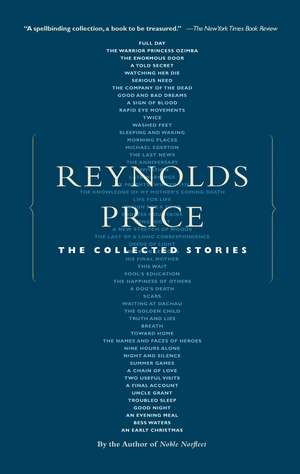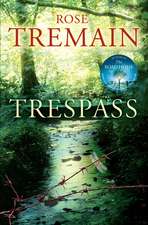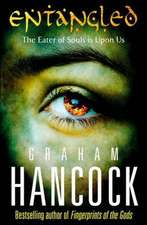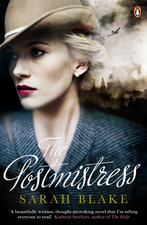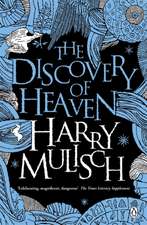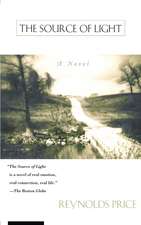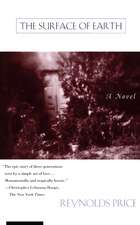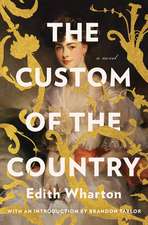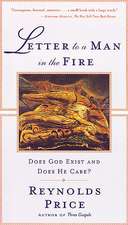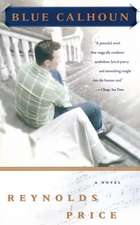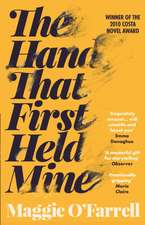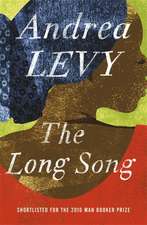The Collected Stories
Autor Reynolds Priceen Limba Engleză Paperback – 10 feb 2004
These fifty stories include two early collections -- The Names and Faces of Heroes and Permanent Errors -- as well as more than two dozen stories that are gathered only in The Collected Stories. In his introduction, the author explains how, at one point, he wrote no stories for almost twenty years. "But," he writes, "once I needed -- for unknown reasons in a new and radically altered life -- to return to the story, it opened before me like a new chance." Indeed, chances abound here in stories that will astonish even Price's most devoted readers as they travel through not only the author's native North Carolina but also Jerusalem, the American Southwest, Europe, and Asia.
Preț: 242.12 lei
Nou
Puncte Express: 363
Preț estimativ în valută:
46.33€ • 48.37$ • 38.34£
46.33€ • 48.37$ • 38.34£
Carte disponibilă
Livrare economică 14-28 martie
Preluare comenzi: 021 569.72.76
Specificații
ISBN-13: 9780743244992
ISBN-10: 0743244990
Pagini: 640
Dimensiuni: 127 x 203 x 38 mm
Greutate: 0.66 kg
Ediția:Reprint
Editura: Scribner
Colecția Scribner
ISBN-10: 0743244990
Pagini: 640
Dimensiuni: 127 x 203 x 38 mm
Greutate: 0.66 kg
Ediția:Reprint
Editura: Scribner
Colecția Scribner
Notă biografică
Reynolds Price (1933–2011) was born in Macon, North Carolina. Educated at Duke University and, as a Rhodes Scholar, at Merton College, Oxford University, he taught at Duke beginning in 1958 and was the James B. Duke Professor of English at the time of his death. His first short stories, and many later ones, are published in his Collected Stories. A Long and Happy Life was published in 1962 and won the William Faulkner Award for a best first novel. Kate Vaiden was published in 1986 and won the National Book Critics Circle Award. The Good Priest's Son in 2005 was his fourteenth novel. Among his thirty-seven volumes are further collections of fiction, poetry, plays, essays, and translations. Price is a member of both the American Academy of Arts and Letters and the American Academy of Arts and Sciences, and his work has been translated into seventeen languages.
Extras
Chapter 1
FULL DAY
Early afternoon in the midst of fall; but the sun was behind him, raw-egg streaks of speedy light from a ball-sized furnace in a white sky. Buck even skewed his rearview mirror to dodge the hot glare that would only be natural three hours from now. Am I nodding off? He thought he should maybe pull to the shoulder and rest for ten minutes. No, he'd yet to eat; his breakfast biscuit was thinning out. One more call; then he'd push on home, be there by dark. But he took the next sharp bend in the road; and damn, the light was still pouring at him, redder now.
Buck shrugged in his mind and thought of a favorite fact of his boyhood -- how he'd searched old papers and books of his father's for any word on the great Krakatoa volcanic eruption in 1883. He'd heard about it years later in school -- how an entire island went up that August in the grandest blast yet known to man. The sea for miles was coated with powdered rock so thick that ships couldn't move. And for more than a year, sunsets everywhere on Earth were reddened by millions of tons of airborne dust. Buck's mother would tell him, each time he asked, that the night before her wedding in 1884, the sunset scared her worse than his father did.
Like boys in general, he'd consumed disasters of all shapes and sizes but only from books and the silent movies of his childhood. Otherwise he often thought of himself as an average tame fish, safe in his tank. He'd missed the First War by only a month and was several years too old at Pearl Harbor; so even now, at fifty-three, he'd never witnessed anything worse than a simple crossroads collision, one death with very little blood. He suddenly saw how the light this afternoon was similar to that, though hadn't he watched the wreck in springtime? Early April maybe -- surely dogwood was blooming.
Buck had sat at the Stop sign in what felt like a globe of silence and watched, slow-motion, as an old man plowed his toy Model A broadside into a gasoline truck, which failed to explode. Buck had got out and joined the young truckdriver in trying to ease the trapped old man (a country doctor, named Burton Vass, crushed by the steering wheel). Awful looking as he was, pinned into the seat, Dr. Vass wouldn't hear of their trying to move him till an ambulance came. But a good ten minutes before it appeared, the doctor actually grinned at their eyes. Then he said "I'm leaving" and left for good. So yes, Buck was maybe a fish in a tank. Whose tank? he wondered. But since he mostly thought about God in his prayers at night, he dropped the question now. God knew, he spent his life in a tank, this Chrysler gunboat, working to bring electric ease to country wives -- stoves, steam irons, washers, freezers, fans.
He turned the mirror down again and tried the sun. It was now even stranger; and the leaves, that had only begun to die, were individually pelted by light till they shivered and flashed. Buck slowed and pulled to the narrow shoulder by a tall pine woods. He'd pushed too far but, on the back seat, he had a wedge of rat cheese, a few saltines and a hot bottled drink. That would calm his head.
The next thing he knew, a voice was speaking from a great distance, toward his left ear. It's nothing but your name. You're dreaming; dream on. But the voice was only saying Sir? Eventually a second voice, young and hectic, echoed the word -- Sir? Please wake up. Something in the pitch of the please helped him rouse. But he didn't reflect that the tone of the voice was much like the younger of his two sons at home.
dIt was almost night; he thought that first. But then he realized his eyes had cleared. It was dimmer, yes; the sun was tamer. He glanced at the clock -- a quarter past four.
Then from as far off as in his sleep, the older voice came at him again, "Are you all right?"
He looked to his left and was startled to see a woman and a child. Young woman, boy child -- maybe thirty and ten. They were two steps back from his side of the car; but at once their faces made him want them closer, though both were tense with doubt and fear. He lowered the window. "Good afternoon."
The woman was the one who retreated a step.
Fearless, the boy came on to the car.
Buck could have touched him. But he settled for touching the brim of his hat, a worn World War II bomber's cap. "Was I snoring too loud?"
The boy said "I'm Gid Abernathy. No sir, I just thought you were dead."
It struck Buck cold. He actually put a hand out before him and flexed his fingers; then he worked them quickly one by one as if at a keyboard, running scales. He smiled at the boy. "Thanks, Gid, but not yet."
Gid's worry wasn't spent. "The schoolbus sets me down right here. Ten minutes ago, when I got out, I saw you slumped at the wheel and all; so I knocked on your glass and you didn't budge. I even tried to open your door --"
Buck noticed that oddly he'd locked it on stopping, a first time surely. It didn't strike him as brave or risky that a child tried to help so trustingly. This time and place -- 1953 in the coastal plain of North Carolina -- were slow and safe; everybody knew it and moved accordingly. Gid was curious and very likely kind, not heroic. Still Buck thanked him and started explaining how tired he'd got from skipping lunch. He should have known not to mention hunger in a woman's presence, not in those times. Maybe in fact he did know it and, half-aware, brought down the rest of the day on himself.
The woman was wearing a clean house dress with short sleeves that showed her strong, but not plump, arms. Her face was an open country face; surely she also had never met with harm or deceit. While Buck thought that, she stepped up slowly through his thoughts and rested a long hand on Gid's bony shoulder. "I'm Gid's mother, Nell Abernathy. He always eats an after-school sandwich. I'll fix you and him one together, if you like." It seemed as natural, and she seemed as ready, as if they were in a cool kitchen now and she were slicing homemade bread and spreading butter that her own hands had churned.
Buck fixed on the best of her homely features. She had an amazing abundance of hair, not the new rust-red you saw so often now since the war but the deep auburn you imagine on women in daguerreotypes, the hair that looks as if each strand bears a vein that pipes blood through it. He'd never seen the like in his time; and he wanted to say so but thought it would sound too forward, too fast. He felt he was smiling anyhow and that now was the moment to say his own name, open the door and stand up at least. But while his eyes had cleared in the nap, he suddenly wondered if his legs would obey. They felt long gone, not asleep exactly but not all there. He tried it though.
A half-hour later he'd drunk buttermilk, eaten a thick tomato sandwich on store-bought bread and said what he thought would be goodbye to Gid. Gid said he was due at a touch-football game a mile due north in the woods from here. As he shook Buck's hand, the boy made his plan sound natural as any town child's game. Only when his thin short gallant frame had shut the porch door and run down the steps did Buck recall his own country boyhood. Whoever played football in the woods? But he quickly imagined a clearing big enough for two pygmy teams. And for the first time, he thought of a father, Who's the man around here? Is he dead, run-off or still at work? But it didn't seem urgent to ask for him yet.
So he looked to Gid's mother, here at the sink four steps away. Her back was to him, and he knew on sight that now she'd literally forgot he was here. Plain as she was, she was that good to see, that empty of wishes for him to perform. All his life he'd tried to show women the boundless thanks he felt for their being. From his long-dead mother on the day he was born, to Lib his wife just yesterday morning, Buck tried to tell each woman who helped him the strongest fact he knew in life, You're reason enough to stay on here. He honestly felt it and toward most women. To be sure, he knew there were bad women somewhere; he'd never met one. So he always meant the praise he gave them, mostly selfless praise with no hopes of any dramatic answer. And here past fifty, still he fell in love several times a month, with a face in a diner or crossing the street ahead of his bumper or dark on his back in a hot hotel room, staring at nothing better to see than a ceiling fan and old piss stains from the room above. He knew, and still could cherish, the fact of love-on-sight whenever his mind saw a winning girl; it would gently lie back on itself and tell him, Buck, rest here for good.
Not that he had. When he was twenty-seven he married Lib and had touched no other woman since, not with a purpose warmer than courtesy. That never stopped the joy or his ceaseless thanks. Hell, women had not only made him but named him -- Will from his mother, Buckeye in childhood from his favorite sister. Now he fished out his pocket watch -- quarter to five, Lib would be starting supper. He'd be half an hour late, no major crime. He folded the paper napkin with a care due Irish linen, and he said "I'm going to be late for supper." But his legs didn't move to stand and leave.
Buck's guess had been right; Nell jerked at the sudden sound of his voice and looked around, wild-eyed for an instant. But calm again, she said "You sure?"
"Of what?" Now his legs were trying to stand.
"That you can make it home?"
"Do I look that bad?"
She took the question seriously enough to move a step toward him and study his face. "You look all right. I just meant, you being dizzy on the road and sleeping so deep in the car when Gid found you --"
He was upright now but his head was light. "I could drive this last stretch, bound and blindfolded."
She looked again and said "You may have to."
Buck meant for his grin to force one from Nell. But no, it didn't work; she was solemn as church, though better to see. Could he look that bad? He tried to remember where his car was parked. Had he driven on here from where he pulled off? Had he left it there and walked here with them? And where was here? He looked all round him -- a normal kitchen in a well-worn house, maybe sixty years old, a high dim ceiling, heart-pine floor, white walls smoked to an even gray. He said "Did we leave my car by the road?"
Nell seemed to nod.
So he looked to the door that Gid had walked through and aimed for that. At first he thought he crossed half the distance, but the final half then doubled on him and kept on multiplying the space till each further step was harder to take; and he thought his feet were sinking through the floor, then his calves and knees, his waist and chest, till even his mouth had sunk and was mute before he could call on Nell or God or the air itself for strength or rescue.
It felt like a healing year of nights, endless dark with heart-easing dreams. But when his eyes opened, it looked to Buck no darker than when he had tried to leave the woman's kitchen. He heard a clock tick, it was near his face, it said five forty -- a black Big Ben, with the bone-rattling bell that he used to wake up early to beat. His mother solemnly gave him one, the day he left home for his first real job. But surely he'd told Lib to chuck it, years back. Or was he doing the thing he'd done so often lately -- dreaming he was young, in his first big boarding house, strong as a boy, with the body to prove it in daylight and dark?
He was lying on his stomach on some kind of bed, under light cover. With both dry hands, he felt down his length from the top of his butt to nearly the knees. All that skin was bare; and upward, the sides of his chest and shoulders were warm but naked too. And when he felt beneath himself, his dick and balls were warm and soft. Still what surprised Buck was the calm soul in him -- no fear, no regret in a mind as fearful as any not locked in a state institution. He shut both eyes and gradually searched the sheet beneath him, far as he could reach. His right hand soon met a block that was big but soft. His fingers stopped against it.
A woman's voice said "You know you're safe."
Buck's eyes were still shut. In the hope of knowing whether this was a dream, he thought In three seconds I'll open my eyes, I'll look straight ahead, then shut them again. He counted to three, looked, saw the same clock -- five forty-two -- and shut them again. It proved he was alive, awake and sane, though apparently stripped in a woman's bed. Nell, he finally thought of the name; then the memory of her face. He firmly believed he still hadn't touched her. Two things may have happened. I fainted, somehow Nell got me in here, but why am I stripped? Or I've been here days, maybe years, and am sick.
He had not been prone to wild thoughts, not in his life till now at least; and he halfway liked it. He suspected he smiled. But Gid -- oh Christ. Is Gid on hand? Buck tried to see if his hand could lift off the pillow -- yes. He held it up and listened to the house. No sounds at all, not even from Nell. He settled back, brought his right hand to his face and felt for beard -- the normal stubble of late afternoon. So he told her "It feels very safe. Thanks, Nell. But did I collapse? Am I someway sick?"
She had seemed to sit on the edge of the bed, facing out from him toward the door -- Buck saw the open door and a blank hall beyond it. And now she gave no sign of moving, surely not toward him. She said "You had a little sinking spell. You may have blanked out, but you didn't fall hard. I helped you in here. You slept half an hour."
"With you here beside me?"
"I just got back," she said.
"From where?"
"The phone. I called your wife."
"How do you know her?"
Her voice was smiling. "You'll have to excuse me, but I searched your pocket and found her number. I didn't know what --"
Buck said "Don't worry. But what did you say?"
"That you stopped by here, just feeling weak. That I thought you'd be back on the road soon, but did she know anything I ought to know?"
Buck almost laughed. "Such as, am I a killer?"
Her voice stayed pleasant. "Such as, do you have seizures? Are you diabetic?"
"What did Lib say?"
"Is Lib your wife? She said you were normal, far as she knew, just maybe exhausted."
Buck smiled but, on its own, his mind thought Exactly. Nobody but Lib's allowed to be sick. Lib was having what she herself called "the longest menopause on human record." Good-hearted as she was till five years ago, in the midst of that winter -- with no word of warning -- she suddenly balled up tight as wax till, for weeks on end, Buck could hardly see her, much less touch and warm her. Next she seemed to grow in-turned eyes, set all down her body, to watch herself -- her own long stock of pains and self-pity, when he'd been the famous complainer so long.
By now they could sometimes laugh about it; and everywhere else in her life with others -- their sons, her friends -- Lib seemed to be waking from a long hard dream. She'd yet to welcome him truly back. And even if she did, the harm was done now and might never heal. She'd turned from his care and need so often that Buck was permanently lonesome in ways he hadn't felt since boyhood, roaming the deep woods north of his house and pressing his lips to dry tree-bark, just for something to lean his body against, some living thing to know that young Buck was clean and warm and could be touched with pleasure.
His right hand had stayed where it found Nell's hip. Three layers of cover kept them apart; he'd never probed or tried to stroke her, and she'd never pressed back into his fingers. As he went on waking, he began to like their balked contact. It gave him a trace of the friendly warmth of his sister Lulie, who was less than one year older than he and with whom he'd slept till his sixth birthday -- pups in a box, warm and moving like a single heart.
He thought the next question and asked it clearly, "Whose room is this?" Before Nell could speak, he thought of the several answers he dreaded -- her husband's and hers, even young Gid's. Not that he feared their linen and blankets, he just hoped to be in an open space, one he could rest in from here on out. He felt that happy and it sprang up through him in a peaceful flow.
Nell said "My father built this bed, oh sixty years ago. He and Mother used it, all their life together. She died and he came here to live with us, brought nothing much but his clothes and this bed. He helped us a lot till he went, last winter."
"He died?"
"Pneumonia."
"So it's you and the boy, on your own now?"
"Seems like," she said. She gave a little chuckle as if she sat alone on the moon and watched her distant amazing life.
"How do you live?"
She laughed out brightly. "Like squirrels in the trees! No, I sew for people. Gid works in the summer, on the next farm over. My dad left us a small piece of money. We do all right, nothing grand but enough."
Then the lack of a husband and father was sure. I'II ask to stay. Buck understood that the thought should have shocked him. It didn't. The calm poured on through his chest, and for several minutes he napped again. When he came to, his right hand was back by his side; and he spoke without looking, "Why am I naked?"
She said "Remember? It was your idea. You had a little accident, when you blacked out."
"Oh God, I'm sorry."
Nell said "Forget it. It was just in the front, a spot the size of a baby's hand."
"Did I wet my shirt too?"
"Not a bit," she said. "That was your idea; I tried to stop you."
Then I have to stay.
She said "I've got you some clean clothes out."
"You're a lightning seamstress." But then he thought Her husband's clothes.
"My dad's," she said. "You're his same size."
"I couldn't accept them."
"Oh he'd be thrilled. He couldn't bear to waste a half-inch of string. And Gid'll be way too tall when he's grown."
"You good at predicting the future?" Buck said.
She laughed again. "Height runs in his family, most of the men --"
Buck rushed to stop her before she clouded the good air between them with a useless name, "I'll be much obliged then, for one pair of pants."
Nell said "They're laid out here on the chair, khakis as clean as cloth ever gets and a clean pair of step-ins. I'm bound to go now and start our supper. You think you feel like trying to stand?" She seemed unhurried but as bent on leaving as if a walk to the dark heart of Africa faced her now.
Never, no ma'm, I'll lie right here. But he tried to move both legs and they worked. And his eyes were clear. All that refused was his mind, Stay here. You're actually needed here. Not so, she and Gid are doing all right. Ask her though; just see what she says. Buck heard his voice say the reckless thing, "Nell, what if I said 'Please let me stay'?"
He expected she'd wait to think that through. And at once she rose from the edge of the bed and took three steps on the bare wood floor. Then she said "We had this time, here now. Your own supper's cooking, up the road, this minute."
As her low voice moved, Buck knew she was right. She seemed to know much more than he remembered; whatever had happened, if anything new, it hadn't changed the tone of her voice. So at least he could trust that he hadn't been cruel or made a promise that he couldn't keep. Then he saw his course clearly. The decent thing was to try standing up, getting dressed, saying thank you and heading on home. So he turned to his side and threw off the cover. He saw his bare body; then said "I'm sorry" and reached again for the sheet at least, to hide his lap. For the first time, that he remembered here, he looked toward Nell.
She stood by a tall mahogany wardrobe and was half-turned away, lifting a bathrobe from the high-backed chair. She was naked as he and had been naked all that time she was near him. Before she could cover herself, Buck rushed to print her body deep in his mind. She was still young everywhere, with firm pale skin and no visible scars (Lib's side was pocked by the cavernous scar of a ruptured appendix). And the hair of her crotch was the same high color of life and health that she showed the world on her striking head. Then she was hid in the faded robe; and with no further look or word, she brushed on past him and left the room.
Buck went to the same chair, found his pants in a clean ragged towel, his shirt on a hanger -- Nell had managed to iron it -- a pair of blue boxer shorts and the khakis she mentioned. He put on his socks first, the shirt, then the pants. They were stiff with starch and two inches short. He thought of his mother's old comic greeting for outgrown pants, "Son, I see you're expecting high water" (they lived twenty miles from the Roanoke River, a famous flooder).
Was this time-out, here under this roof, some high-water mark in all his life? With the tender mind and heart he got from his mother at birth, Buck had wanted an unadventurous life. And except for Lib's three awful labors (two live boys and one dead girl), he'd virtually got it. His chief adventures had come in his head. Alone on the road, he sometimes lived through active nights with imaginary women. But mostly he still enacted each possible threat to life and limb, any time his family stepped out of sight. And his own body, strong till now, had always seemed a rickety bridge over too deep a gorge for a confident life in some place hard as the present world.
So sure, whatever had happened here -- if nothing but what Nell owned up to, a fainting spell and a half-hour rest -- was like a splendid volunteer, the giant flower that suddenly blooms at the edge of the yard, where you least expect, from a secret hybrid in last year's seed that has bided its time. When he'd tied his shoes, he stepped to the dark old mirror and smoothed his tangled hair. Nothing visibly changed, not to my eyes -- and who knows me better? Well, Lib but she won't see this time, whatever happened here. And if anything did, it was gentle and finished. He could hear Nell drawing water in the kitchen. In less than an hour, if fate agreed, he'd be in his own house, among his first duties. He bent again to the peeling mirror and awarded his face a final grin. Then he went out to thank Nell Abernathy for one happy day.
In four months Buck will die from a growth that reached decisive weight in his body this full afternoon and threw him down.
His elder son has made this unreal gift for his father on the eighty-ninth passing of Buck's birthday, though he died these thirty-five years ago.
Copyright © 1993, 1992, 1991, 1990, 1989, 1987, 1986, 1982, 1970, 1969, 1968, 1967, 1965, 1964, 1963, 1962, 1961, 1959, 1958, 1954 by Reynolds Price
FULL DAY
Early afternoon in the midst of fall; but the sun was behind him, raw-egg streaks of speedy light from a ball-sized furnace in a white sky. Buck even skewed his rearview mirror to dodge the hot glare that would only be natural three hours from now. Am I nodding off? He thought he should maybe pull to the shoulder and rest for ten minutes. No, he'd yet to eat; his breakfast biscuit was thinning out. One more call; then he'd push on home, be there by dark. But he took the next sharp bend in the road; and damn, the light was still pouring at him, redder now.
Buck shrugged in his mind and thought of a favorite fact of his boyhood -- how he'd searched old papers and books of his father's for any word on the great Krakatoa volcanic eruption in 1883. He'd heard about it years later in school -- how an entire island went up that August in the grandest blast yet known to man. The sea for miles was coated with powdered rock so thick that ships couldn't move. And for more than a year, sunsets everywhere on Earth were reddened by millions of tons of airborne dust. Buck's mother would tell him, each time he asked, that the night before her wedding in 1884, the sunset scared her worse than his father did.
Like boys in general, he'd consumed disasters of all shapes and sizes but only from books and the silent movies of his childhood. Otherwise he often thought of himself as an average tame fish, safe in his tank. He'd missed the First War by only a month and was several years too old at Pearl Harbor; so even now, at fifty-three, he'd never witnessed anything worse than a simple crossroads collision, one death with very little blood. He suddenly saw how the light this afternoon was similar to that, though hadn't he watched the wreck in springtime? Early April maybe -- surely dogwood was blooming.
Buck had sat at the Stop sign in what felt like a globe of silence and watched, slow-motion, as an old man plowed his toy Model A broadside into a gasoline truck, which failed to explode. Buck had got out and joined the young truckdriver in trying to ease the trapped old man (a country doctor, named Burton Vass, crushed by the steering wheel). Awful looking as he was, pinned into the seat, Dr. Vass wouldn't hear of their trying to move him till an ambulance came. But a good ten minutes before it appeared, the doctor actually grinned at their eyes. Then he said "I'm leaving" and left for good. So yes, Buck was maybe a fish in a tank. Whose tank? he wondered. But since he mostly thought about God in his prayers at night, he dropped the question now. God knew, he spent his life in a tank, this Chrysler gunboat, working to bring electric ease to country wives -- stoves, steam irons, washers, freezers, fans.
He turned the mirror down again and tried the sun. It was now even stranger; and the leaves, that had only begun to die, were individually pelted by light till they shivered and flashed. Buck slowed and pulled to the narrow shoulder by a tall pine woods. He'd pushed too far but, on the back seat, he had a wedge of rat cheese, a few saltines and a hot bottled drink. That would calm his head.
The next thing he knew, a voice was speaking from a great distance, toward his left ear. It's nothing but your name. You're dreaming; dream on. But the voice was only saying Sir? Eventually a second voice, young and hectic, echoed the word -- Sir? Please wake up. Something in the pitch of the please helped him rouse. But he didn't reflect that the tone of the voice was much like the younger of his two sons at home.
dIt was almost night; he thought that first. But then he realized his eyes had cleared. It was dimmer, yes; the sun was tamer. He glanced at the clock -- a quarter past four.
Then from as far off as in his sleep, the older voice came at him again, "Are you all right?"
He looked to his left and was startled to see a woman and a child. Young woman, boy child -- maybe thirty and ten. They were two steps back from his side of the car; but at once their faces made him want them closer, though both were tense with doubt and fear. He lowered the window. "Good afternoon."
The woman was the one who retreated a step.
Fearless, the boy came on to the car.
Buck could have touched him. But he settled for touching the brim of his hat, a worn World War II bomber's cap. "Was I snoring too loud?"
The boy said "I'm Gid Abernathy. No sir, I just thought you were dead."
It struck Buck cold. He actually put a hand out before him and flexed his fingers; then he worked them quickly one by one as if at a keyboard, running scales. He smiled at the boy. "Thanks, Gid, but not yet."
Gid's worry wasn't spent. "The schoolbus sets me down right here. Ten minutes ago, when I got out, I saw you slumped at the wheel and all; so I knocked on your glass and you didn't budge. I even tried to open your door --"
Buck noticed that oddly he'd locked it on stopping, a first time surely. It didn't strike him as brave or risky that a child tried to help so trustingly. This time and place -- 1953 in the coastal plain of North Carolina -- were slow and safe; everybody knew it and moved accordingly. Gid was curious and very likely kind, not heroic. Still Buck thanked him and started explaining how tired he'd got from skipping lunch. He should have known not to mention hunger in a woman's presence, not in those times. Maybe in fact he did know it and, half-aware, brought down the rest of the day on himself.
The woman was wearing a clean house dress with short sleeves that showed her strong, but not plump, arms. Her face was an open country face; surely she also had never met with harm or deceit. While Buck thought that, she stepped up slowly through his thoughts and rested a long hand on Gid's bony shoulder. "I'm Gid's mother, Nell Abernathy. He always eats an after-school sandwich. I'll fix you and him one together, if you like." It seemed as natural, and she seemed as ready, as if they were in a cool kitchen now and she were slicing homemade bread and spreading butter that her own hands had churned.
Buck fixed on the best of her homely features. She had an amazing abundance of hair, not the new rust-red you saw so often now since the war but the deep auburn you imagine on women in daguerreotypes, the hair that looks as if each strand bears a vein that pipes blood through it. He'd never seen the like in his time; and he wanted to say so but thought it would sound too forward, too fast. He felt he was smiling anyhow and that now was the moment to say his own name, open the door and stand up at least. But while his eyes had cleared in the nap, he suddenly wondered if his legs would obey. They felt long gone, not asleep exactly but not all there. He tried it though.
A half-hour later he'd drunk buttermilk, eaten a thick tomato sandwich on store-bought bread and said what he thought would be goodbye to Gid. Gid said he was due at a touch-football game a mile due north in the woods from here. As he shook Buck's hand, the boy made his plan sound natural as any town child's game. Only when his thin short gallant frame had shut the porch door and run down the steps did Buck recall his own country boyhood. Whoever played football in the woods? But he quickly imagined a clearing big enough for two pygmy teams. And for the first time, he thought of a father, Who's the man around here? Is he dead, run-off or still at work? But it didn't seem urgent to ask for him yet.
So he looked to Gid's mother, here at the sink four steps away. Her back was to him, and he knew on sight that now she'd literally forgot he was here. Plain as she was, she was that good to see, that empty of wishes for him to perform. All his life he'd tried to show women the boundless thanks he felt for their being. From his long-dead mother on the day he was born, to Lib his wife just yesterday morning, Buck tried to tell each woman who helped him the strongest fact he knew in life, You're reason enough to stay on here. He honestly felt it and toward most women. To be sure, he knew there were bad women somewhere; he'd never met one. So he always meant the praise he gave them, mostly selfless praise with no hopes of any dramatic answer. And here past fifty, still he fell in love several times a month, with a face in a diner or crossing the street ahead of his bumper or dark on his back in a hot hotel room, staring at nothing better to see than a ceiling fan and old piss stains from the room above. He knew, and still could cherish, the fact of love-on-sight whenever his mind saw a winning girl; it would gently lie back on itself and tell him, Buck, rest here for good.
Not that he had. When he was twenty-seven he married Lib and had touched no other woman since, not with a purpose warmer than courtesy. That never stopped the joy or his ceaseless thanks. Hell, women had not only made him but named him -- Will from his mother, Buckeye in childhood from his favorite sister. Now he fished out his pocket watch -- quarter to five, Lib would be starting supper. He'd be half an hour late, no major crime. He folded the paper napkin with a care due Irish linen, and he said "I'm going to be late for supper." But his legs didn't move to stand and leave.
Buck's guess had been right; Nell jerked at the sudden sound of his voice and looked around, wild-eyed for an instant. But calm again, she said "You sure?"
"Of what?" Now his legs were trying to stand.
"That you can make it home?"
"Do I look that bad?"
She took the question seriously enough to move a step toward him and study his face. "You look all right. I just meant, you being dizzy on the road and sleeping so deep in the car when Gid found you --"
He was upright now but his head was light. "I could drive this last stretch, bound and blindfolded."
She looked again and said "You may have to."
Buck meant for his grin to force one from Nell. But no, it didn't work; she was solemn as church, though better to see. Could he look that bad? He tried to remember where his car was parked. Had he driven on here from where he pulled off? Had he left it there and walked here with them? And where was here? He looked all round him -- a normal kitchen in a well-worn house, maybe sixty years old, a high dim ceiling, heart-pine floor, white walls smoked to an even gray. He said "Did we leave my car by the road?"
Nell seemed to nod.
So he looked to the door that Gid had walked through and aimed for that. At first he thought he crossed half the distance, but the final half then doubled on him and kept on multiplying the space till each further step was harder to take; and he thought his feet were sinking through the floor, then his calves and knees, his waist and chest, till even his mouth had sunk and was mute before he could call on Nell or God or the air itself for strength or rescue.
It felt like a healing year of nights, endless dark with heart-easing dreams. But when his eyes opened, it looked to Buck no darker than when he had tried to leave the woman's kitchen. He heard a clock tick, it was near his face, it said five forty -- a black Big Ben, with the bone-rattling bell that he used to wake up early to beat. His mother solemnly gave him one, the day he left home for his first real job. But surely he'd told Lib to chuck it, years back. Or was he doing the thing he'd done so often lately -- dreaming he was young, in his first big boarding house, strong as a boy, with the body to prove it in daylight and dark?
He was lying on his stomach on some kind of bed, under light cover. With both dry hands, he felt down his length from the top of his butt to nearly the knees. All that skin was bare; and upward, the sides of his chest and shoulders were warm but naked too. And when he felt beneath himself, his dick and balls were warm and soft. Still what surprised Buck was the calm soul in him -- no fear, no regret in a mind as fearful as any not locked in a state institution. He shut both eyes and gradually searched the sheet beneath him, far as he could reach. His right hand soon met a block that was big but soft. His fingers stopped against it.
A woman's voice said "You know you're safe."
Buck's eyes were still shut. In the hope of knowing whether this was a dream, he thought In three seconds I'll open my eyes, I'll look straight ahead, then shut them again. He counted to three, looked, saw the same clock -- five forty-two -- and shut them again. It proved he was alive, awake and sane, though apparently stripped in a woman's bed. Nell, he finally thought of the name; then the memory of her face. He firmly believed he still hadn't touched her. Two things may have happened. I fainted, somehow Nell got me in here, but why am I stripped? Or I've been here days, maybe years, and am sick.
He had not been prone to wild thoughts, not in his life till now at least; and he halfway liked it. He suspected he smiled. But Gid -- oh Christ. Is Gid on hand? Buck tried to see if his hand could lift off the pillow -- yes. He held it up and listened to the house. No sounds at all, not even from Nell. He settled back, brought his right hand to his face and felt for beard -- the normal stubble of late afternoon. So he told her "It feels very safe. Thanks, Nell. But did I collapse? Am I someway sick?"
She had seemed to sit on the edge of the bed, facing out from him toward the door -- Buck saw the open door and a blank hall beyond it. And now she gave no sign of moving, surely not toward him. She said "You had a little sinking spell. You may have blanked out, but you didn't fall hard. I helped you in here. You slept half an hour."
"With you here beside me?"
"I just got back," she said.
"From where?"
"The phone. I called your wife."
"How do you know her?"
Her voice was smiling. "You'll have to excuse me, but I searched your pocket and found her number. I didn't know what --"
Buck said "Don't worry. But what did you say?"
"That you stopped by here, just feeling weak. That I thought you'd be back on the road soon, but did she know anything I ought to know?"
Buck almost laughed. "Such as, am I a killer?"
Her voice stayed pleasant. "Such as, do you have seizures? Are you diabetic?"
"What did Lib say?"
"Is Lib your wife? She said you were normal, far as she knew, just maybe exhausted."
Buck smiled but, on its own, his mind thought Exactly. Nobody but Lib's allowed to be sick. Lib was having what she herself called "the longest menopause on human record." Good-hearted as she was till five years ago, in the midst of that winter -- with no word of warning -- she suddenly balled up tight as wax till, for weeks on end, Buck could hardly see her, much less touch and warm her. Next she seemed to grow in-turned eyes, set all down her body, to watch herself -- her own long stock of pains and self-pity, when he'd been the famous complainer so long.
By now they could sometimes laugh about it; and everywhere else in her life with others -- their sons, her friends -- Lib seemed to be waking from a long hard dream. She'd yet to welcome him truly back. And even if she did, the harm was done now and might never heal. She'd turned from his care and need so often that Buck was permanently lonesome in ways he hadn't felt since boyhood, roaming the deep woods north of his house and pressing his lips to dry tree-bark, just for something to lean his body against, some living thing to know that young Buck was clean and warm and could be touched with pleasure.
His right hand had stayed where it found Nell's hip. Three layers of cover kept them apart; he'd never probed or tried to stroke her, and she'd never pressed back into his fingers. As he went on waking, he began to like their balked contact. It gave him a trace of the friendly warmth of his sister Lulie, who was less than one year older than he and with whom he'd slept till his sixth birthday -- pups in a box, warm and moving like a single heart.
He thought the next question and asked it clearly, "Whose room is this?" Before Nell could speak, he thought of the several answers he dreaded -- her husband's and hers, even young Gid's. Not that he feared their linen and blankets, he just hoped to be in an open space, one he could rest in from here on out. He felt that happy and it sprang up through him in a peaceful flow.
Nell said "My father built this bed, oh sixty years ago. He and Mother used it, all their life together. She died and he came here to live with us, brought nothing much but his clothes and this bed. He helped us a lot till he went, last winter."
"He died?"
"Pneumonia."
"So it's you and the boy, on your own now?"
"Seems like," she said. She gave a little chuckle as if she sat alone on the moon and watched her distant amazing life.
"How do you live?"
She laughed out brightly. "Like squirrels in the trees! No, I sew for people. Gid works in the summer, on the next farm over. My dad left us a small piece of money. We do all right, nothing grand but enough."
Then the lack of a husband and father was sure. I'II ask to stay. Buck understood that the thought should have shocked him. It didn't. The calm poured on through his chest, and for several minutes he napped again. When he came to, his right hand was back by his side; and he spoke without looking, "Why am I naked?"
She said "Remember? It was your idea. You had a little accident, when you blacked out."
"Oh God, I'm sorry."
Nell said "Forget it. It was just in the front, a spot the size of a baby's hand."
"Did I wet my shirt too?"
"Not a bit," she said. "That was your idea; I tried to stop you."
Then I have to stay.
She said "I've got you some clean clothes out."
"You're a lightning seamstress." But then he thought Her husband's clothes.
"My dad's," she said. "You're his same size."
"I couldn't accept them."
"Oh he'd be thrilled. He couldn't bear to waste a half-inch of string. And Gid'll be way too tall when he's grown."
"You good at predicting the future?" Buck said.
She laughed again. "Height runs in his family, most of the men --"
Buck rushed to stop her before she clouded the good air between them with a useless name, "I'll be much obliged then, for one pair of pants."
Nell said "They're laid out here on the chair, khakis as clean as cloth ever gets and a clean pair of step-ins. I'm bound to go now and start our supper. You think you feel like trying to stand?" She seemed unhurried but as bent on leaving as if a walk to the dark heart of Africa faced her now.
Never, no ma'm, I'll lie right here. But he tried to move both legs and they worked. And his eyes were clear. All that refused was his mind, Stay here. You're actually needed here. Not so, she and Gid are doing all right. Ask her though; just see what she says. Buck heard his voice say the reckless thing, "Nell, what if I said 'Please let me stay'?"
He expected she'd wait to think that through. And at once she rose from the edge of the bed and took three steps on the bare wood floor. Then she said "We had this time, here now. Your own supper's cooking, up the road, this minute."
As her low voice moved, Buck knew she was right. She seemed to know much more than he remembered; whatever had happened, if anything new, it hadn't changed the tone of her voice. So at least he could trust that he hadn't been cruel or made a promise that he couldn't keep. Then he saw his course clearly. The decent thing was to try standing up, getting dressed, saying thank you and heading on home. So he turned to his side and threw off the cover. He saw his bare body; then said "I'm sorry" and reached again for the sheet at least, to hide his lap. For the first time, that he remembered here, he looked toward Nell.
She stood by a tall mahogany wardrobe and was half-turned away, lifting a bathrobe from the high-backed chair. She was naked as he and had been naked all that time she was near him. Before she could cover herself, Buck rushed to print her body deep in his mind. She was still young everywhere, with firm pale skin and no visible scars (Lib's side was pocked by the cavernous scar of a ruptured appendix). And the hair of her crotch was the same high color of life and health that she showed the world on her striking head. Then she was hid in the faded robe; and with no further look or word, she brushed on past him and left the room.
Buck went to the same chair, found his pants in a clean ragged towel, his shirt on a hanger -- Nell had managed to iron it -- a pair of blue boxer shorts and the khakis she mentioned. He put on his socks first, the shirt, then the pants. They were stiff with starch and two inches short. He thought of his mother's old comic greeting for outgrown pants, "Son, I see you're expecting high water" (they lived twenty miles from the Roanoke River, a famous flooder).
Was this time-out, here under this roof, some high-water mark in all his life? With the tender mind and heart he got from his mother at birth, Buck had wanted an unadventurous life. And except for Lib's three awful labors (two live boys and one dead girl), he'd virtually got it. His chief adventures had come in his head. Alone on the road, he sometimes lived through active nights with imaginary women. But mostly he still enacted each possible threat to life and limb, any time his family stepped out of sight. And his own body, strong till now, had always seemed a rickety bridge over too deep a gorge for a confident life in some place hard as the present world.
So sure, whatever had happened here -- if nothing but what Nell owned up to, a fainting spell and a half-hour rest -- was like a splendid volunteer, the giant flower that suddenly blooms at the edge of the yard, where you least expect, from a secret hybrid in last year's seed that has bided its time. When he'd tied his shoes, he stepped to the dark old mirror and smoothed his tangled hair. Nothing visibly changed, not to my eyes -- and who knows me better? Well, Lib but she won't see this time, whatever happened here. And if anything did, it was gentle and finished. He could hear Nell drawing water in the kitchen. In less than an hour, if fate agreed, he'd be in his own house, among his first duties. He bent again to the peeling mirror and awarded his face a final grin. Then he went out to thank Nell Abernathy for one happy day.
In four months Buck will die from a growth that reached decisive weight in his body this full afternoon and threw him down.
His elder son has made this unreal gift for his father on the eighty-ninth passing of Buck's birthday, though he died these thirty-five years ago.
Copyright © 1993, 1992, 1991, 1990, 1989, 1987, 1986, 1982, 1970, 1969, 1968, 1967, 1965, 1964, 1963, 1962, 1961, 1959, 1958, 1954 by Reynolds Price
Recenzii
The New York Times Book Review A spellbinding collection, a book to be treasured.
Chicago Tribune Complex, compelling stories....What a pleasure to have in hand.
The New York Times Book Review Nobody writes so well about the joys and sorrows of the family. Nobody else can so deftly capture the lyric intensity of simple happiness.
The Boston Globe Price's best stories are built to last.
Chicago Tribune Complex, compelling stories....What a pleasure to have in hand.
The New York Times Book Review Nobody writes so well about the joys and sorrows of the family. Nobody else can so deftly capture the lyric intensity of simple happiness.
The Boston Globe Price's best stories are built to last.
